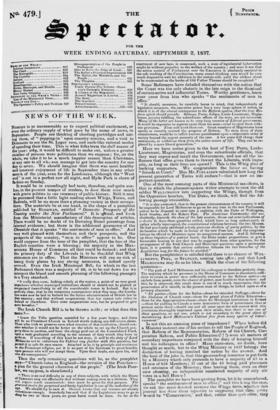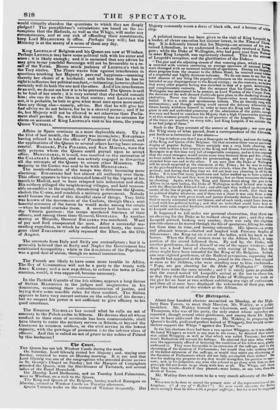NEWS OF THE WEEK.
NOBODY is so unreasonable as to expect political excitement, or even the ordinary supply of what goes by the name of news, in NOBODY is so unreasonable as to expect political excitement, or even the ordinary supply of what goes by the name of news, in
September. People are thinking of shooting partridges and eat- ing them, of " popping-in" upon country cousins, and a visit to Doncaster to see the St. Leger race, and such-like rational modes
of spending their time. This is what folks term the dull season of the year: why, it would be difficult to make out, unless a greater number of persons were politicians than we suppose ; for, on the whole, we take it to be a much happier season than Christmas,
at any rate to all why can manage to get into the country for one day in seven. We should imagine that there was more healthy and innocent enjoyment of life in September than in any other month of the sear, even for the Londoners, although the " West end" is not in a perfect row all night, and Hyde Park is shorn of fashion on Sunday.
It would be in exceedingly bad taste, therefore, and quite use- less, in the present temper of readers, to dose them over much
with grave politics in our summary of public history. Still it may be presumed that a little light reading about Whigs, Tories, and Radicals, will be no more than a pleasing variety in their occupa- tions. The materials lie at our hand, in the shape of a pamphlet published by RIDGWAY, entitled " Domestic Prospects of the Country under the New Parliament." It is official, and flesh from the Ministerial nianufactory of this description of articles. There would be no doubt of its Downing Street parentage from internal evidence; but there is the additional guarantee of the Chronicle that it speaks "the sentiments of men in office." And very well pleased with theroselses and their prospects, and the prospects of the country, " men in office" appear to be. One would suppose from the tone of the pamphlet, that the loss of the English counties were a blessing; the majority in the MEL- BOURNE House of Commons all that could be desired ; and that the primary duty of the Liberals is to be thankful that Whig statesmen are in office. That the Ministers will run no risk of' losing their places by any strong measures, is indeed openly messed. Even the Irish Municipal Bill, for which in the last Parliament there was a majority of 80, is to be cut down (so we interpret the bland and smooth phrasing of the following passage) to a Tory standard.
"It really does seem, looking calmly at the matter, a point of no very great importance whether municipal institutions should or should not be planted or reorganised immediately in all the considerable towns in Ireland. But it is perkctly clear, that be the temporary consequences what they may, the founda- tion mist now be laid in Ireland for the future administration of British law in that country ; and that without corporations, that law cannot rule either in Ireland or elsewhere. Give some corporations now, but be prepared to give awe hereafter."
The Irish Church Bill is to be thrown aside ; or what does this Steen ?—
" Leave tile Tithe question unsettled for a few years longer, and there will be no Protestant Church in Ireland worth making any differences about. Those who wish to preserve even what remains of that institution, should con. eider whether it would not be better on the whole to set up the Church pro- perty there to auction and have the clergy paid out of the Consolidated Fund, Upon a male graduated according to the amount of duty which they have to ewes If soluething of this kind be nut done, it will be the duty of Lord lirdbow rat not to embarrass his Cabinet ony further with this question, but permit it to take its own course. Attached as he is by principle and sentiment to the Protestant religion, yet it is no part of his functions to press benefits upon persons who will nut accept them. Upon their heads, not upon his, will rest the consequences."
Then the only remaining questions will be, as the pamphlet says—" Church.rates in England—the revision of the Poor-law- a plan for the general education of the people." (The Irish Poor- law, we suppose, is abandoned.) " There is no real difficulty in any of these subjects, with which the House of Commons may not effectually deal without coming even to a division. They *ill require ninth examination : time must be given fur that purpose. The prnrient desire for perpetual and hasty legislation is one of the maladies of the €19E. We should try to cure it. 'leaven knows that our statutes are sheerly voluminous enough. Somebody has said that if the Legislature were to go to sleep for two or three years, no great harm would be dune. So far 39 the enactment of new laws is concerned, such a state of legislatorial hybernation might be without prejudice to the welfare of the country ; and were it not that the active control of Parliament over the Executive is absolutely essential to the safe working of the Constitution, many sound-thinking men would be very much disposed to wait fur additions to the statute.roll, until the edifices about to be constructed on the banks of Old Father Thames should be completed."
Some Reformershave deluded themselves with the notion that the Court was the only obstacle in the late reign to the dismissal of certain active and influential Tories. Worthy gentlemen, learn your error from him who speaks "the sentiments of men in office."
" It should, moreover, be carefully borne in mind, that independently of legislative measures, the executive power has a very large sphere of action, in which it is of the utmost consequence to the Reform system, that the true Re- form spirit should preside. Bishops, Peers, Judges, Lords-Lieutenant, Magis- trates, persons fulfilling the subordinate offices of the state, are not immortal. 11/ony of the latter are known to be very busy enemies of Liberal government. It would be expensive to superaeouate them too soon—cruel to eject them with- out provision. Time will work them out. Great numbers of Magistrates have openly or covertly resisted the progress of Reform. To strip them of their commissions, would be to inflict asevere punishment upon a respectable order of society beyond the urgent necessity of the case. A few years will change their sentiments, or withdraw them from the active scenes of life. They can be re- placed by a inure liberal generation."
Here we have notice given to the host of Tory Peers, Lords- Lieutenant, Magistrates, and even the subordinate officials, that they may oppose and insult the Government, and use all the in- fluence that office gives them to thwart the Liberals, with impu- nity, as long as their lives are spared I This is the Whig plan of backing supporters. We congratulate the latter on having " friends at Court? Has Mr. Ft NLAlSOSS calculated how long the present generation of Tories will endure ?—that is now an im- portant question. One of' the most amusing parts of this Ministerial manifesto, is that in which the pleasant-spoken writer attempts to coax the old soldier WELLINGTON into supporting the Whigs, though from the Opposition benches. The Duke, we think, will find the fol- lowing passage irresistible.
"It is also contended, that in the present circumstances of the country it will be impossible for Lord Melbourne to go on for any time in the new Parliament, unless he be disposed to enter into a coalition with the Duke of Wellington, Lord Stanley, aud Sir Robert Peel. The illustrious Commander did an, doubtedly, towards the close of the late session, throw out some indications of a desire to have those questions settled, which have so long embarrassed, or rather wholly interrupted, the constitutional relations between the two Houses. Ile had previously exhibited a truly generous disdain of party politics, by the declaration which he made in favour of the new Poor-law, and the congratu- lations he offered to Ministers upon its unequivocal success. And if, following up those impulses of a patriot heart, the Duke tender propositions, or give a favourable hearing to any that may be suggested from other quarters, for the arrangement of the Irish Church and Municipal questions upon a permanent basis, it is possible that serious collisions between the two branches of Me Legislature may for the future be avoided." But the pamphleteer is satisfied that there is no chance of WEL- LINGTON', PEEL, or STANLEY, coming into office ; and that Lord MELBOURNE may do as he likes. Mark the close of the following quotation— "'the path of Lord Melbourne and his colleagues is therefore perfectly clear. The majority which he possesses in the House of Commons is abundantly suffi- cient to retain in power men sufficiently attached to the Reform systern—to exclude from power' even the chance of power, men hostile to that system : and this, be it observed, this result alone is one of so much importance, that the preservation of it should, in the present state of things, be looked upon as of a primary character. "All parties—those for the Ballot—those for extended Suffrage—those for the Abolition of Church rates—those for grand plans of Public Education— those fur the Appropriation-clause—those for Municipal institutious in Ireland —those for yielding to Canada a inure democratic form of government than at present exists there—should one and all enter upon the new session with this conviction thoroughly impressed upon their minds, that there is not one of these questions, no not one, which is not secondary to the great object of maintaining Lord Melbourne's Cabinet free from every species of embar- rassment."
Is not this an amusing piece of impudence? When before did a Minister instruct one of his scribes to tell the People of England. that Reform of the Representation, Reform of the Church, Cor- poration Reform, and Public Education (I I I) were all matters of secondary importance compared with the duty of keeping himself and his colleagues in office? Many statesmen, no doubt, have thought as much, but to the Whig Ministry in 1837 belongs the distinction of having insulted the nation by the avowal. And the best of the joke is, that this gasconasling nonsense is put forth by a Ministry which only pretends to have a majority of 43 in a House of 658 Members ; 37 out of the 43 being paid plaeemen and retainers of the Ministry; thus leaving them, even on their own showing, an independent unsalaried majority of only six votes in a full House !
The pamphlet we have been quoting from, let it be remembered, speaks" the sentiments of men in office ;" and this bsing the case, we ask the most devoted retainer the Whigs have, whether this journal has diete them injustice in supposing that their policy would be "Conservative," and that, rather than quit offiee, they
would virtually abandon the questions to which they are deeply pledged? The pamphleteer's calculations are based on the as- sumption that the Radicals, as well as the Whigs, will under any aircumstances, and at any risk of offending their constituents, keep Lord MELBOURNE in office. Perhaps they will ; but the Ministry is at the mercy of a score of them any day.



























